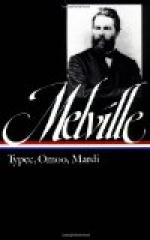“More wit, but, with deference, perhaps less truth, my lord. Say what you will, Fame is an accident; merit a thing absolute. But what matter? Of what available value reputation, unless wedded to power, dentals, or place? To those who render him applause, a poet’s may seem a thing tangible; but to the recipient, ’tis a fantasy; the poet never so stretches his imagination, as when striving to comprehend what it is; often, he is famous without knowing it.”
“At the sacred games of Lazella,” said Yoomy, “slyly crowned from behind with a laurel fillet, for many hours, the minstrel Jarmi wandered about ignorant of the honors he bore. But enlightened at last, he doffed the wreath; then, holding it at arm’s length, sighed forth—Oh, ye laurels! to be visible to me, ye must be removed from my brow!”
“And what said Botargo,” cried Babbalanja, “hearing that his poems had been translated into the language of the remote island of Bertranda?— ’It stirs me little; already, in merry fancies, have I dreamed of their being trilled by the blessed houris in paradise; I can only imagine the same of the damsels of Bertranda.’ Says Boldo, the Materialist,—’Substances alone are satisfactory.’”
“And so thought the mercenary poet, Zenzi,” said Yoomy. “Upon receiving fourteen ripe yams for a sonnet, one for every line, he said to me, Yoomy, I shall make a better meal upon these, than upon so many compliments.”
“Ay,” cried Babbalanja, “‘Bravos,’ saith old Bardianna, but induce flatulency.’”
Said Media, “And do you famous mortals, then, take no pleasure in hearing your bravos?”
“Much, my good lord; at least such famous mortals, so enamored of a clamorous notoriety, as to bravo for themselves, when none else will huzza; whose whole existence is an unintermitting consciousness of self; whose very persons stand erect and self-sufficient as their infallible index, the capital letter I; who relish and comprehend no reputation but what attaches to the carcass; who would as lief be renowned for a splendid mustache, as for a splendid drama: who know not how it was that a personage, to posterity so universally celebrated as the poet Vavona, ever passed through the crowd unobserved; who deride the very thunder for making such a noise in Mardi, and yet disdain to manifest itself to the eye.”
“Wax not so warm, Babbalanja; but tell us, if to his contemporaries Vavona’s person was almost unknown, what satisfaction did he derive from his genius?”
“Had he not its consciousness?—an empire boundless as the West. What to him were huzzas? Why, my lord, from his privacy, the great and good Logodora sent liniment to the hoarse throats without. But what said Bardianna, when they dunned him for autographs?—’Who keeps the register of great men? who decides upon noble actions? and how long may ink last? Alas! Fame has dropped more rolls than she displays; and there are more lost chronicles, than the perished books of the historian Livella.’ But what is lost forever, my lord, is nothing to what is now unseen. There are more treasures in the bowels of the earth, than on its surface.”




